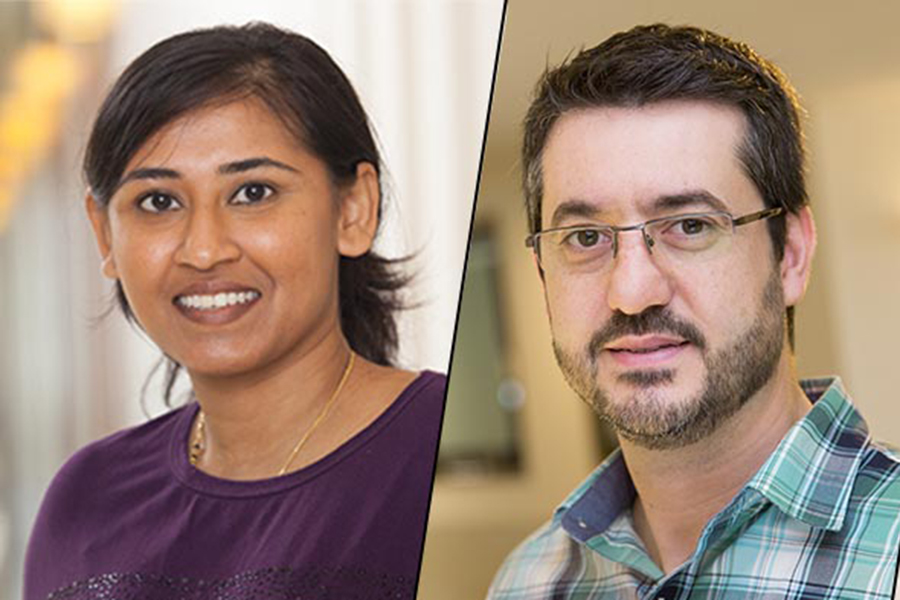
Personal Mention
Four faculty members at Carnegie Mellon in Qatar have been awarded National Priorities Research Program (NPRP) grants by the Qatar National Research Fund. The grants will fund CMU-Q faculty studies on breast cancer, water quality, computer science education, and marine environmental monitoring.
 Saquib Razak, associate teaching professor of computer science, was awarded a grant to expand Alice Middle East, an interactive software tool that guides students through the basics of computer programming. With the NPRP grant, Razak and the Alice Middle East team will develop a three-year curriculum for local middle schools. The new curriculum will focus on computational concepts and critical thinking, which are crucial skills for young people as they enter the workforce.
Saquib Razak, associate teaching professor of computer science, was awarded a grant to expand Alice Middle East, an interactive software tool that guides students through the basics of computer programming. With the NPRP grant, Razak and the Alice Middle East team will develop a three-year curriculum for local middle schools. The new curriculum will focus on computational concepts and critical thinking, which are crucial skills for young people as they enter the workforce.
 Ihab Younis, assistant teaching professor of biological sciences, was awarded a grant to study the molecular indicators of breast cancer, which is the most commonly diagnosed cancer among women in Qatar. The project also seeks to add to the database of breast cancer biomarkers, which will have direct impact on diagnosis and provide novel therapeutic targets and approaches to treatment.
Ihab Younis, assistant teaching professor of biological sciences, was awarded a grant to study the molecular indicators of breast cancer, which is the most commonly diagnosed cancer among women in Qatar. The project also seeks to add to the database of breast cancer biomarkers, which will have direct impact on diagnosis and provide novel therapeutic targets and approaches to treatment.
 Annette Vincent, assistant teaching professor of biological sciences, was awarded a grant for her project on water quality within Qatar. The project uses bacteriophages — viruses that infect bacteria — as biomonitoring tools to provide a more accurate assessment of the types of bacteria present in the water. Vincent’s research could have important implications for Qatar’s water security, perennially a top priority in a country where the drinking water is desalinated seawater. Vincent will collaborate with Basem Shomar, principle investigator of environmental and chemical sciences at Qatar Environment and Energy Research Institute, part of Hamad Bin Khalifa University.
Annette Vincent, assistant teaching professor of biological sciences, was awarded a grant for her project on water quality within Qatar. The project uses bacteriophages — viruses that infect bacteria — as biomonitoring tools to provide a more accurate assessment of the types of bacteria present in the water. Vincent’s research could have important implications for Qatar’s water security, perennially a top priority in a country where the drinking water is desalinated seawater. Vincent will collaborate with Basem Shomar, principle investigator of environmental and chemical sciences at Qatar Environment and Energy Research Institute, part of Hamad Bin Khalifa University.
 Gianni Di Caro, associate teaching professor of computer science, will investigate the monitoring of marine environments over extended periods of time. Di Caro’s team seeks to develop swarms of unmanned aerial and surface robots that are equipped with GPS devices and sensors for environmental monitoring. Because the system will be designed for use in long-running missions, it will allow for repeated, time-indexed data sampling that can help develop distributed and scalable solutions for controlling individual and system-level behaviors.
Gianni Di Caro, associate teaching professor of computer science, will investigate the monitoring of marine environments over extended periods of time. Di Caro’s team seeks to develop swarms of unmanned aerial and surface robots that are equipped with GPS devices and sensors for environmental monitoring. Because the system will be designed for use in long-running missions, it will allow for repeated, time-indexed data sampling that can help develop distributed and scalable solutions for controlling individual and system-level behaviors.
 Jeremy Avigad co-organized the conference “Big Proof” this summer, which gathered research from all over the world to explore ways that logical methods in computer science can be used to support mathematical reasoning. Jeremy Avigad is a professor of Philosophy and Mathematical Sciences in the Department of Philosophy. Find out more about the conference.
Jeremy Avigad co-organized the conference “Big Proof” this summer, which gathered research from all over the world to explore ways that logical methods in computer science can be used to support mathematical reasoning. Jeremy Avigad is a professor of Philosophy and Mathematical Sciences in the Department of Philosophy. Find out more about the conference.
